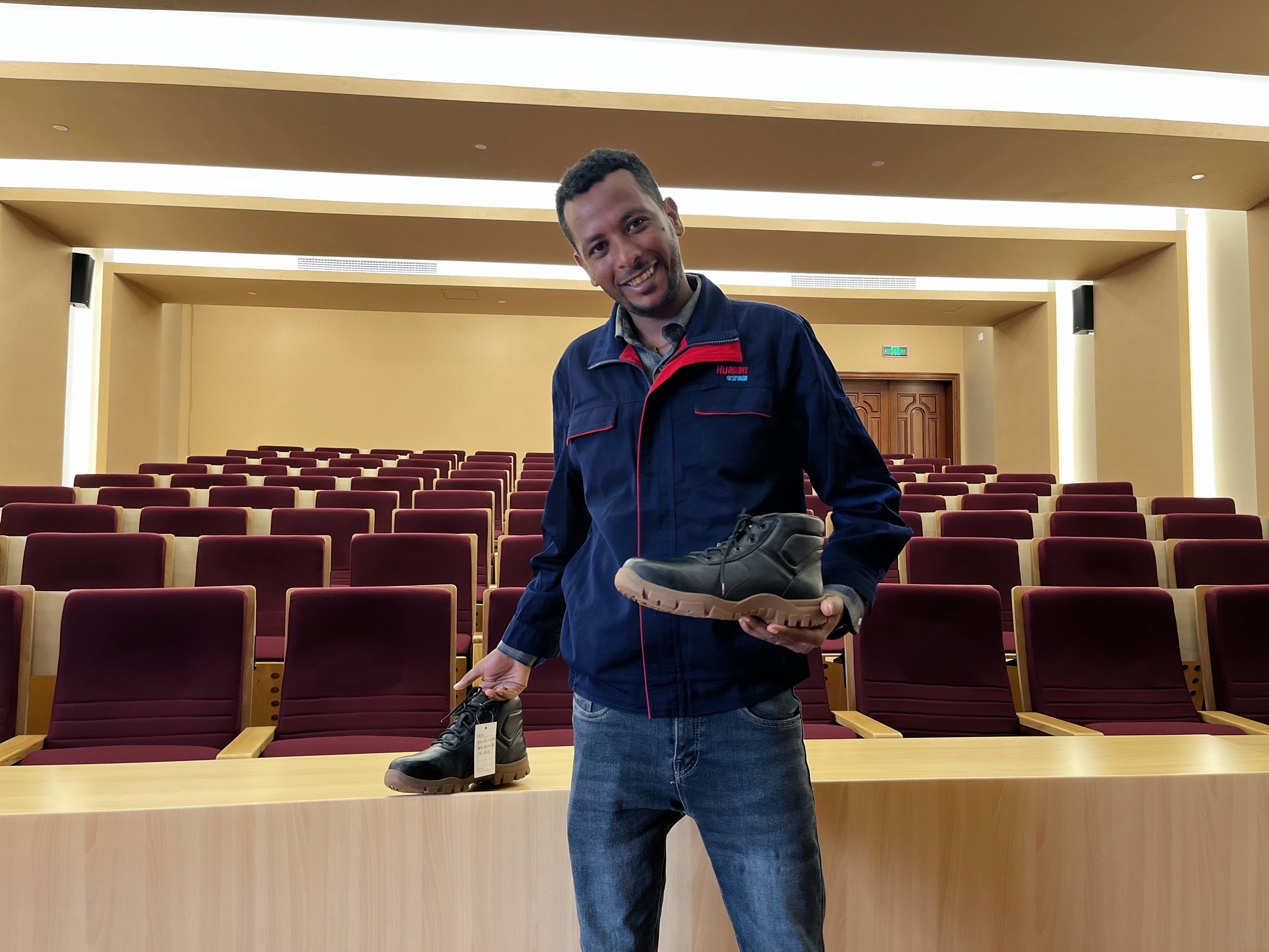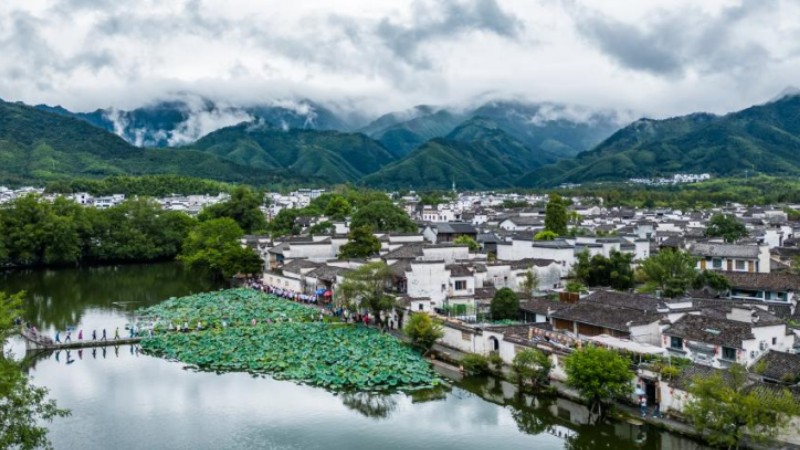Stepping into a brighter future: stories of an Ethiopian shoe factory

Ethiopian workers at the Huajian shoe factory in Addis Ababa, Ethiopia. Photo by Chi Zao.
It's six o'clock in the morning. The dawn light highlights the silhouettes of the workers filing into a Chinese shoe factory in Addis Ababa, Ethiopia. In the factory’s canteen, chefs prepare Injera, a local sour fermented flatbread, as the workers get ready to begin their day.
As Ethiopia’s biggest footwear producer, Huajian has seen it all. Once the largest export enterprise in Ethiopia, the company saw its output halted for over three years due to the pandemic and political upheaval. After a lengthy hiatus, production resumed in March, and the company has since worked tirelessly to deliver on its commitment to the people of Africa by creating new jobs and advancing industrialisation there.
"I've been working with this Chinese company for over 11 years. It has been collaborating with Ethiopians to boost the country's industrial development, and now we are taking the next step on a new path," said Adamseged Demerew, the company’s 30-year-old HR manager.
Taking the steps toward a better life

32-year-old Mindaye Gulilat has been working for Huajian over a decade. Photo by Chi Zao.
Ethiopians at this factory are well-versed in the Chinese proverb "a journey of a thousand miles begins with a single step," which is the most accurate description of Huajian Group's progress in Africa.
In 2011, when the company first came to the country, it only had a small footwear factory, but exports of Ethiopian leather goods then increased by 57% that same year. Thanks to its nine cutting-edge shoe production lines and corresponding shoe material facilities, the company can now produce three million pairs of women's shoes yearly.
32-year-old Mindaye Gulilat's "single step" toward a better life came ten years ago when Huajian Group expanded its business in Ethiopia. He began as a worker for the company, but through studying technology and the Chinese language, he has advanced to the position of customer and marketing manager.
"A decade ago, Ethiopia's economy relied primarily on agriculture and animal husbandry, and finding work in the contemporary industrial sector was not easy. After landing a job in Huajian and studying technology under the tutelage of Chinese experts, I can now pass on the knowledge to Ethiopian youth," said Gulilat.
Guliat's hard work has paid off. His salary has climbed substantially over the past decade at the Chinese firm, and he is now a proud father of a five-year-old son and a three-year-old daughter.
“My kids can now converse in Chinese with me. My dream is to save enough money to buy my house and send my children to study in China when they grow up,” said Guliat.
While Guliat dreams of a cosy family life, Mulugeta Ayana, 29, and Silenat Demelash, 24, a young couple who work on Huajian's assembly line, have much more ambitious goals: they hope to one day open their own shoe shop using the skills they've learned at the Chinese firm.
“We've been married for four years; we met while working here. Now my husband is a leader with over 36 employees, and I'm an operator on the assembly line," said Silenat.
To help fulfil his wife's lifelong ambition of becoming a sleeper designer, Mulugeta has set a three-year goal of learning skills and amassing enough cash to build their shoe store.
"I just got a promotion, and it's time for us to put our professional lives first," said Mulugeta.
“My husband and I agree that we'd like to have a family of four kids. Our salaries cannot support such a lifestyle, so we must work and study hard to start our own business. This factory is a big classroom; we can learn much from it,” said Silenat.
With the Chinese company extending its operations and hiring more locals, many young Ethiopians, such as Mulugeta and Silenat, have chosen Huajian as a stepping stone to a better life. Ethiopian News Agency reported in May that Huajian had created over 12,000 jobs for locals since the company started its investment in the country in 2011.
Together into a brighter future

Adamseged Demerew, a 30-year-old HR manager, has fulfilled?his dream to start a family after years of working at Huajian. Photo by Adamseged.
According to Ethiopian News Agency, Huajian had made a total investment of 150 million US dollars in Ethiopia before the COVID-19 pandemic, generating revenues of 200 million dollars. However, the company must now find a new way to maintain its former glory after the pandemic dampened its manufacturing, and the United States has opted to discontinue its duty-free trading relationship with Ethiopia.
The African Growth and Opportunity Act (AGOA) is a US initiative that eliminates tariffs on goods exported from sub-Saharan African nations to the USA. In 2022, the deal was cancelled by the US due to “Ethiopia’s human rights violations”.
Doctor Kalu Kebede, a 39-year-old general advisor to the Chinese company, stated that the end of AGOA could cause severe damage to Ethiopia, a country that needs foreign capital to develop its own industries.
“We've tried the Western ways, and they simply don't work. I believe it is time for Ethiopia to attract more Chinese investment, and that our company's strategy needs to adapt to the country's present climate,” said Kalu.
Kalu's suggestion echoes China's decision to provide zero-tariff treatment to 98 percent of taxable commodities originating in Ethiopia in 2023. Huajian is now building an international Light Industry City in the outskirts of Addis Ababa, allowing international companies, including Chinese ones, to set up business in Ethiopia. The Chinese company is expanding into a new market by providing services like building industry-related infrastructure and consulting for foreign firms interested in relocating to Ethiopia.
Over 20 Chinese tech companies dispatched teams to study the industrial city project in the first half of 2023, with an emphasis on solar energy, electric vehicles, and medicine.
According to Ethiopian News Agency, Huajian’s Light Industry City is expected to produce footwear and apparel in large volumes in the coming five years, with job creation ranging from 30,000 to 50,000 and foreign exchange earnings of 1.5 billion US dollars.
“Ethiopia's economy is mostly built on agriculture and animal husbandry, and if we are to flourish, we must build our own industries. I've gone to China, and I believe the Chinese economic model is appropriate for Ethiopia's future development; we can learn from Shenzhen's modernization," said Kalu.
By attracting more Chinese investment and more Chinese tech businesses to the new industry city, Kalu argued, the two countries could collaborate to lay Africa's industrial base while also advancing frontier technologies like electric vehicles.
“Chinese companies have no interest in Ethiopian politics and seek just to conduct open and honest trade with their African counterparts. I believe that with more Chinese investment and experience in Ethiopia, we can build a better future together,” said Kalu.
Photos
Related Stories
- Chinese pharmaceutical firms eye bigger footprint in Africa as economic ties blossom
- Stronger China-Zambia friendship brings concrete benefits to Zambian people
- Putting China-Zambia ties in top gear
- China, Zambia to boost cooperation as ties elevated
- Full text: Joint Statement between the People's Republic of China and the Republic of Zambia on Establishing the Comprehensive Strategic and Cooperative Partnership
Copyright © 2023 People's Daily Online. All Rights Reserved.









